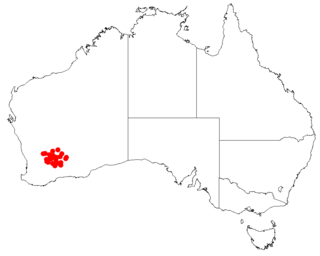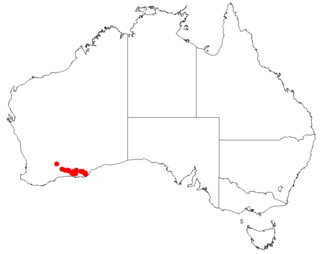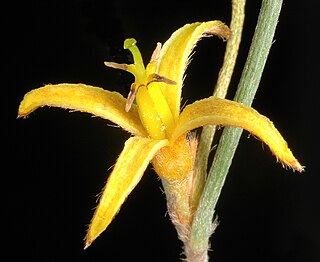
Banksia sclerophylla is a species of shrub that is endemic to the south-west of Western Australia. It has spreading stems, linear, pinnatipid leaves with triangular lobes on the sides, yellow flowers in heads of between forty and seventy, and elliptical follicles.

Banksia shuttleworthiana, commonly known as bearded dryandra, is a species of low, spreading shrub that is endemic to Western Australia. It has thin, woolly-hairy stems, linear pinnatisect leaves, creamy brown to purplish flowers in heads of about forty and later, only a few egg-shaped follicles in each head.

Banksia tridentata, commonly known as yellow honeypot, is a low-growing shrub that is endemic to the southwest of Western Australia. It has narrow egg-shaped leaves with a sharp point on the tip, greenish yellow flowers in heads of between 85 and 125, and elliptical to egg-shaped follicles.

Grevillea intricata is a species of flowering plant in the family Proteaceae and is endemic to the west of Western Australia. It is a densely-branched shrub with tangled branchlets, divided leaves with linear lobes and clusters of pale greenish-white to light cream-coloured flowers.

Isopogon adenanthoides, commonly known as spider coneflower, is species of flowering plant in the family Proteaceae and is endemic to the southwest of Western Australia. It is an erect shrub with sharply-pointed, trifid leaves and spherical heads of pink flowers.

Persoonia brevirhachis is a species of flowering plant in the family Proteaceae and is endemic to the south-west of Western Australia. It is an erect, often spreading shrub with smooth, compact bark, mostly narrow spatula-shaped to lance-shaped leaves with the narrower end towards the base and yellow to greenish yellow flowers borne singly or in pairs in leaf axils.

Persoonia inconspicua is a species of flowering plant in the family Proteaceae and is endemic to the south-west of Western Australia. It is an erect, often spreading shrub with branchlets and leaves that are densely hairy when young, linear leaves and relatively small greenish yellow flowers usually borne singly or in pairs.

Persoonia cymbifolia is a species of flowering plant in the family Proteaceae and is endemic to the south of Western Australia. It is an erect, spreading shrub with smooth bark, hairy young branchlets, linear to narrow oblong leaves and yellow flowers borne singly or in groups of up to three on a short rachis.
Persoonia leucopogon is a species of flowering plant in the family Proteaceae and is endemic to Western Australia. It is an erect to low-lying shrub with branchlets that are densely hairy when young, narrow oblong to narrow elliptic leaves and yellow or greenish yellow flowers borne singly or in groups of up to four on a rachis up to 2 mm (0.079 in) long.

Persoonia trinervis is a species of flowering plant in the family Proteaceae and is endemic to the south-west of Western Australia. It is an erect, sometimes spreading shrub with densely hairy young branchlets, spatula-shaped or lance-shaped leaves with the narrower end towards the base, and densely hairy yellow flowers.

Persoonia angustiflora is a species of flowering plant in the family Proteaceae and is endemic to the south-west of Western Australia. It is an erect shrub with hairy branches and leaves, linear, more or less cylindrical leaves and yellow or greenish yellow flowers arranged singly or in groups of up to four.
Persoonia scabra is a species of flowering plant in the family Proteaceae and is endemic to the south-west of Western Australia. It is an erect to spreading shrub with hairy young branchlets, narrow oblong to lance-shaped leaves, and yellow flowers arranged singly, in pairs or threes, with a scale leaf at the base.

Persoonia filiformis is a species of flowering plant in the family Proteaceae and is endemic to the south-west of Western Australia. It is a small, erect shrub with hairy young branchlets, linear leaves and greenish yellow flowers borne singly or in groups of up to twenty on a rachis up to 30 mm (1.2 in) long.

Persoonia saundersiana is a species of flowering plant in the family Proteaceae and is endemic to the south-west of Western Australia. It is an erect, spreading shrub with hairy young branchlets, linear leaves, and bright yellow flowers borne in groups of up to twenty-five on a rachis up to 100 mm (3.9 in) that continues to grow after flowering.

Persoonia comata is a species of flowering plant in the family Proteaceae and is endemic to the south-west of Western Australia. It is an erect, sometimes spreading to low-lying shrub with mostly smooth bark, spatula-shaped to lance-shaped leaves with the narrower end towards the base and yellow flowers usually in groups of ten to fifty along a rachis up to 250 mm (9.8 in) long.

Grevillea erinacea is a species of flowering plant in the family Proteaceae and is endemic to the south-west of Western Australia. It is a spreading shrub with deeply-divided leaves with three to five linear lobes, rotated through 90°, and cream-coloured flowers with a white style.
Petrophile chrysantha is a species of flowering plant in the family Proteaceae and is endemic to the south-west of Western Australia. It is a small shrub with crowded, sharply-pointed, pinnately-divided leaves, and oval heads of hairy, cream-coloured to dark yellow flowers.

Petrophile conifera is a species of flowering plant in the family Proteaceae and is endemic to the south-west of Western Australia. It is a bushy, much-branched shrub with pinnate, sharply-pointed leaves, and oval heads of hairy, cream-coloured to yellowish white flowers.

Petrophile plumosa is a species of flowering plant in the family Proteaceae and is endemic to southwestern Western Australia. It is a shrub with rigid, sharply-pointed, sometimes lobed leaves, and more or less spherical heads of hairy, pale yellow flowers.

Isopogon tridens, commonly known as the three-toothed coneflower, is a species of flowering plant in the family Proteaceae and is endemic to the southwest of Western Australia. It is a shrub with wedge-shaped leaves with two or three sharply-pointed teeth, and flattened-spherical heads of glabrous creamy white, sometimes purple flowers.

















